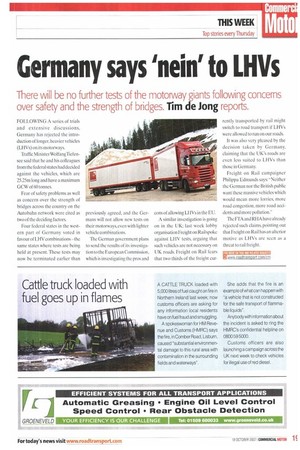Germany says 'nein' to LHVs
Page 19

If you've noticed an error in this article please click here to report it so we can fix it.
There will be no further tests of the motorway giants following concerns over safety and the strength of bridges. Tim de Jong reports.
FOLLOWING A series of trials and extensive discussions, Germany has rejected the introduction of longer, heavier vehicles (LHVs) on its motorways.
Traffic Minister WolfangTiefensee said that he and his colleagues from the federal states had decided against the vehicles, which are 25.25m long and have a maximum GCW of 60 tonnes.
Fear of safety problems as well as concern over the strength of bridges across the country on the Autobahn network were cited as two of the deciding factors.
Four federal states in the western part of Germany voted in favour of LHV combinations— the same states where tests are being held at present. These tests may now be terminated earlier than previously agreed, and the Germans will not allow new tests on their motorways, even with lighter vehicle combinations.
The German government plans to send the results of its investigation to the European Commission, which is investigating the pros and cons of allowing LHVs in the EU.
A similar investigation is going on in the UK; last week lobby organisation Freight on Rail spoke against LHV tests, arguing that such vehicles are not necessary on UK roads. Freight on Rail fears that two thirds of the freight cur rently transported by rail might switch to road transport if LHVs were allowed to run on our roads.
It was also very pleased by the decision taken by Germany, claiming that the UK's roads are even less suited to LHVs than those in Germany.
Freight on Rail campaigner Philippa Edmunds says: "Neither the German nor the British public want these massive vehicles which would mean more lorries, more road congestion, more road accidents and more pollution."
The Fl A and RHA have already rejected such claims, pointing out that Freight on Rail has an ulterior motive as LHVs are seen as a threat to rail freight.






























































































































































































